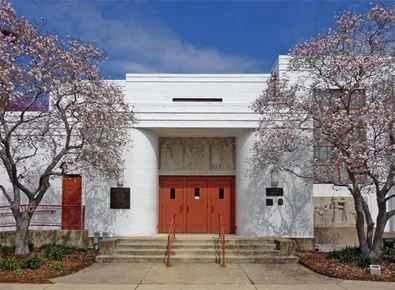
Colloque international
L’aménagement du territoire, un projet de société.
Idéologies, doctrines et représentations entre la France, le nord de l’Europe et l’Amérique du Nord
Planning as a welfare project.
Ideologies, models and representations between France, Northern Europe
and Northern America
Organisation scientifique
- Jean-Baptiste Minnaert (Sorbonne Université | Centre André-Chastel)
- Dorian Bianco (Sorbonne Université | Centre André-Chastel)
- Colloque organisé en partenariat avec la Danish Arts Foundation, le Groupe d'aménagement volontaire et le Groupe d'études géopolitiques
La maîtrise de l’espace par l’homme est une histoire du temps long : les paysans évoqués par Marc Bloch la pratiquaient dès le XIe siècle lorsqu’ils essartaient la Beauce et la Champagne pour mettre en culture les sols. Mais c'est au XXe siècle que l'organisation du territoire fait l'objet d'une planification par les politiques d'État-Providence (Welfare State). On peut citer les Greenbelt towns américaines, le Town and country planning britannique et l’Aménagement du territoire français. L’urbanisme du XXe siècle a initié un remodelage volontaire des paysages orienté vers l’architecture du logement, l’accès aux infrastructures et la préservation des ressources naturelles. Le colloque international intitulé Planning as a welfare project invoque les méthodes de l’histoire de l’architecture, de l’urbanisme et de la photographie, ainsi que celles de l’histoire socio-culturelle, pour apporter un nouvel éclairage sur les modèles et les représentations de l’aménagement en France, dans les pays d'Europe septentrionale et occidentale et en Amérique du Nord.
The control of space-making by mankind has a long history, if we think of Marc Bloch citing the 11th century peasants from the Beauce to the Champagne clearing the woods to plough the soils. But it is during the 20th century that the organisation of the territory became a model of spatial planning informed by the policies of the welfare states. We can mention the American Greenbelt Towns, the British Town and country planning and the French Aménagement du territoire. 20th century urban planning has initiated a voluntary remodelling of landscapes that focused on the architecture of dwellings, the access to infrastructures and the preservation of natural resources. The international colloquium entitled Planning as a welfare project addresses architectural and planning history, photographic history along with socio-cultural history in order to shed a new light on the models and the representations of welfare planning between France, North-Western Europe and Northern America.
Les enregistrements de certaines interventions sont disponibles sur la chaîne Canal-U du Centre André Chastel à cette adresse.
PROGRAMME
Jeudi 21 octobre
Matinée
- 10h Ouverture par Jean-Baptiste Minnaert
- Dorian Bianco, Introduction
Session 1 : The making of Welfare : concepts and politics
Modérateur : Dorian Bianco
- 10h30-11h Niels Wium Olesen (Institut de culture et de société, Université d’Aarhus),
The Danish Welfare State : Planning, Pragmatism and the Art of the Politically Possible - 11h-11h30 Mikkel Thelle (Centre danois d’histoire urbaine, Université d’Aarhus),
Modeling the welfare citizen : Nordic exhibitions and the spacetime of everyday life 1920-1958 - 11h30 Discussion
- 12h Pause déjeuner
Après-midi
Session 2: Architecture and Welfare planning : an international approach
Modérateur : Jean-Baptiste Minnaert
- 14h-14h30 Stéphane Gaessler (Sorbonne Université, Centre André-Chastel), Models of spatial planning in the USSR between 1945 and 1970 and Western influences
- 14h30-15h Dirk van den Heuvel (Centre Jaap Bakema, Het Nieuwe Instituut), Université de technologie de Delft),
A country planning its change, Jaap Bakema and the construction ofthe Dutch welfare state - 15h Pause
- 15h 15-16h Élodie Bitsindou (Sorbonne Université, Centre André-Chastel),
Reclaiming the suburban ideal : History of a Transatlantic model - 16h Discussion
Vendredi 22 octobre 2021
Matinée
Session 3 : Welfare planning in France : models and realisations
Modérateur : Stéphane Gaessler
- 10h-10h30 Benoît Pouvreau (Service du patrimoine culturel de Seine-Saint-Denis),
Aux sources du Plan d'aménagement national de 1950. Eugène Claudius-Petit et l'aménagement du territoire en France - 10h30-11h Dorian Bianco (Sorbonne Université, Centre André-Chastel),
In search of a French model of welfare planning. Jean-François Gravier’s view of spatial planning in L’espace vital - Discussion
- Pause déjeuner
Après-midi
Session 4: Representations of Welfare and critiques of planning
Modérateur : Élodie Bitsindou
- 14h-14h30 Caroline Maniaque-Benton (École nationale supérieure d’architecture de Normandie),
Alternatives to welfare state : advocacy planning and do-it-yourself - 14h30-15h Mikkel Høghøj (Musée national du Danemark, Université d’Aarhus),
Between the city and the sea : the construction of urban seaside parks as welfare landscapes in 20th century Copenhagen - 15h Discussion
- 15h15 Pause
- 15h30-16h Raphaële Bertho (Laboratoire InTRu, Université de Tours),
The use of photographic representation in welfare planning: between documentation and prospective - 16h Discussion
- Jean-Baptiste Minnaert (Sorbonne Université, Centre André-Chastel), Conclusion
Entrée libre dans la limite des places disponibles et sur présentation du passe sanitaire.
Le colloque sera également transmis par zoom
Pour obtenir le lien contactez dorian [dot] bianco hotmail [dot] fr (Dorian Bianco)
hotmail [dot] fr (Dorian Bianco)
